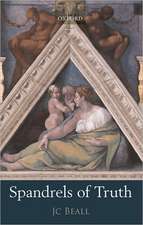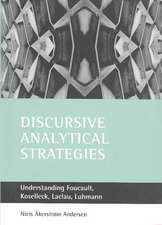Wittgenstein's Anthropological Philosophy: History of Analytic Philosophy
Autor Gunter Gebaueren Limba Engleză Hardback – 23 aug 2017
| Toate formatele și edițiile | Preț | Express |
|---|---|---|
| Paperback (1) | 524.61 lei 38-44 zile | |
| Springer International Publishing – 3 aug 2018 | 524.61 lei 38-44 zile | |
| Hardback (1) | 586.70 lei 43-57 zile | |
| Springer International Publishing – 23 aug 2017 | 586.70 lei 43-57 zile |
Din seria History of Analytic Philosophy
- 18%
 Preț: 948.29 lei
Preț: 948.29 lei - 15%
 Preț: 586.88 lei
Preț: 586.88 lei - 18%
 Preț: 728.74 lei
Preț: 728.74 lei - 18%
 Preț: 734.59 lei
Preț: 734.59 lei - 15%
 Preț: 527.66 lei
Preț: 527.66 lei - 15%
 Preț: 584.43 lei
Preț: 584.43 lei - 15%
 Preț: 527.15 lei
Preț: 527.15 lei -
 Preț: 385.84 lei
Preț: 385.84 lei - 15%
 Preț: 586.88 lei
Preț: 586.88 lei - 18%
 Preț: 886.62 lei
Preț: 886.62 lei - 15%
 Preț: 641.71 lei
Preț: 641.71 lei - 15%
 Preț: 582.95 lei
Preț: 582.95 lei - 15%
 Preț: 641.03 lei
Preț: 641.03 lei - 18%
 Preț: 780.19 lei
Preț: 780.19 lei - 15%
 Preț: 640.06 lei
Preț: 640.06 lei - 18%
 Preț: 729.84 lei
Preț: 729.84 lei - 18%
 Preț: 727.80 lei
Preț: 727.80 lei - 15%
 Preț: 698.15 lei
Preț: 698.15 lei -
 Preț: 322.31 lei
Preț: 322.31 lei - 18%
 Preț: 730.35 lei
Preț: 730.35 lei - 15%
 Preț: 637.59 lei
Preț: 637.59 lei -
 Preț: 387.96 lei
Preț: 387.96 lei - 15%
 Preț: 640.71 lei
Preț: 640.71 lei -
 Preț: 393.52 lei
Preț: 393.52 lei - 18%
 Preț: 896.21 lei
Preț: 896.21 lei -
 Preț: 389.88 lei
Preț: 389.88 lei - 15%
 Preț: 585.40 lei
Preț: 585.40 lei -
 Preț: 396.40 lei
Preț: 396.40 lei - 18%
 Preț: 892.42 lei
Preț: 892.42 lei -
 Preț: 384.70 lei
Preț: 384.70 lei -
 Preț: 386.81 lei
Preț: 386.81 lei - 18%
 Preț: 734.59 lei
Preț: 734.59 lei - 18%
 Preț: 785.11 lei
Preț: 785.11 lei
Preț: 586.70 lei
Preț vechi: 690.24 lei
-15% Nou
Puncte Express: 880
Preț estimativ în valută:
112.27€ • 117.51$ • 93.44£
112.27€ • 117.51$ • 93.44£
Carte tipărită la comandă
Livrare economică 31 martie-14 aprilie
Preluare comenzi: 021 569.72.76
Specificații
ISBN-13: 9783319561509
ISBN-10: 3319561502
Pagini: 271
Ilustrații: XV, 271 p. 3 illus.
Dimensiuni: 148 x 210 x 23 mm
Greutate: 0.49 kg
Ediția:1st ed. 2017
Editura: Springer International Publishing
Colecția Palgrave Macmillan
Seria History of Analytic Philosophy
Locul publicării:Cham, Switzerland
ISBN-10: 3319561502
Pagini: 271
Ilustrații: XV, 271 p. 3 illus.
Dimensiuni: 148 x 210 x 23 mm
Greutate: 0.49 kg
Ediția:1st ed. 2017
Editura: Springer International Publishing
Colecția Palgrave Macmillan
Seria History of Analytic Philosophy
Locul publicării:Cham, Switzerland
Cuprins
Chapter 1. The Practice of Philosophy.- Chapter 2. From Seeing to Practice.- Chapter 3. The Turn to Anthropology.- Chapter 4. Intentions and Perspectives of the Language Game.- Chapter 5. The Interaction between Rules and Habitus.- Chapter 6. Materialism and Belief.- Chapter 7. Wittgenstein’s Pictures: Aspect-Seeing and Experience.
Notă biografică
Gunter Gebauer has been Professor for Philosophy at the Free University Berlin, Germany, since 1978. He is a former member of the centers of excellence “Performative Cultures” and “Languages of Emotion”. His primary research interests include historical anthropology, social philosophy and language theory.
Textul de pe ultima copertă
This book explores how Wittgenstein’s personal life provided more of a reference point for his philosophical work than has been previously thought. Focusing on two key phases in Wittgenstein’s life during which he dramatically changed his philosophical orientation and reinvented both his intellectual methods and himself, the author presents and alternative understanding of Wittgenstein and his work. The book firstly addresses the period of his “anthropological turn” (1929-1932), in which Wittgenstein developed one of his central arguments concerning the role of the body in the acquisition of language and the rules of social practice. The second key phase, commencing after the end of the Second World War, was one of introspection, during which Wittgenstein became intensely preoccupied by inner events, sensations, and his own personality. As his work evolved, the anthropological aspects became the primary focus of his work by the end of his life. Providing an accessible and novel insightinto Wittgenstein’s work and his interest in ‘continental’ philosophy, this translation will appeal to a wide audience.
Caracteristici
Draws attention to an essential overlooked characteristic of Wittgenstein's philosophy Explores Wittgenstein’s roles as engineer, logician, school teacher, architect and philosopher Highlights Wittgenstein's interest in continental philosophy as opposed to the Anglo-Saxon interpretation of his works
















